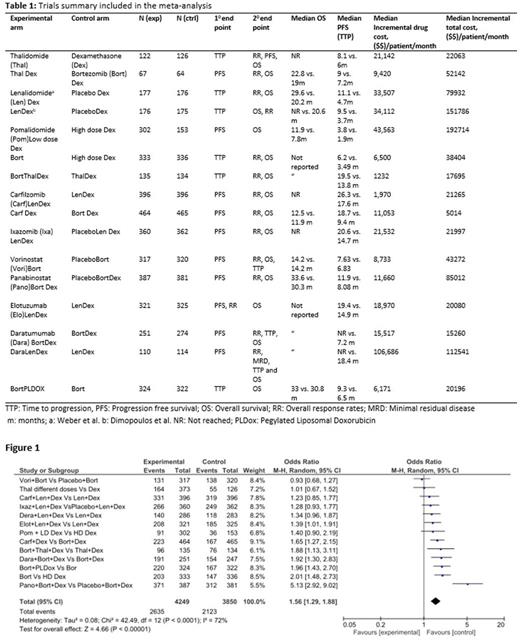Abstract
Background:The remarkable progress in the outcomes of RRMM in the last 2 decades with the introduction of novel therapies have come with significant additional cost and adverse events (AEs). We quantified the incremental efficacy, AEs, and cost of newly approved anti-RRMM drugs by conducting a meta-analysis of pivotal phase III Randomized Controlled Trials (RCTs) used for registration.
Methods: A systematic search of MEDLINE, SCOPUS and Cochrane databases was performed to identify RCTs leading to approvals of new agents for the treatment of RRMM from January 1, 1999 to July 1, 2017. Abstracts presented within the last four years at major hematology and oncology meetings were also identified. Hazard Ratios (HR) for Progression free Survival (PFS), Overall survival (OS), and Odds Ratios (OR) for all grade III/ IV AEs along with the respective 95% Confidence Intervals (CI) reported in the included studies were weighed using a generic inverse variance approach and were pooled using random effects model meta-analyses using RevMan 5.3 software. Incremental costs were calculated from 1) drug prices listed in Micromedex Redbook and 2) costs of management of AEs and health services costs based on published literature (adjusted for inflation to match 2017-US dollar value) for experimental compared to control arms.
Results: Sixteen RCTs (n=8,683) involving 14 different treatment options qualified for inclusion (Table 1). Pooled analyses demonstrated a significant improvement in OS (HR 0.74; 95% CI: 0.62-0.89;p=0.002) and PFS (HR 0.55; 95% CI 0.48-0.64; p<0.00001) with the use of newly approved drugs or combinations compared to control arm. However, there was substantial increase in the risk of adverse events with the use of new-targeted agents and combination compared to the controls (OR for Grade III-IV toxicities 1.56, 95% CI: 1.29-1.88, p <0.00001). (Fig 1). There was no difference in treatment discontinuation and toxic deaths between the two groups. The median incremental drug price for experimental agents was $ 13,588/patient/month compared to the control arm. The new agents or combinations led to incremental cost of care by a median of $ 133,914/patient/month.
Conclusion: Despite improvements in efficacy, newly approved drugs for RRMM are associated with increased rates of AEs, and add exponentially to financial burden, exceeding by far the acceptable willingness-to-pay threshold of most developed countries. Toxicities and costs are highest for immunomodulators and are likely to increase when the agents are used in unselected populations after the approvals leading to heavier health-related and financial burden to society. Strategies to lower cost of novel therapies, and better predictive tools to select patients are imperative for sustainability of RRMM treatments.
Dhakal: Celgene: Honoraria. Chhabra: Cardinal Health: Honoraria; Incyte: Honoraria. Hari: Janssen: Honoraria; Celgene: Consultancy, Honoraria, Research Funding; Millennium Pharmaceuticals, Inc., a wholly owned subsidiary of Takeda Pharmaceutical Company Limited: Honoraria, Research Funding; Takeda Pharmaceuticals: Consultancy, Honoraria, Research Funding; Spectrum: Consultancy, Research Funding; Amgen: Consultancy, Honoraria, Research Funding; Bristol Myers Squibb: Consultancy, Research Funding; Novartis: Consultancy; Sanofi: Honoraria, Research Funding.
Author notes
Asterisk with author names denotes non-ASH members.


This feature is available to Subscribers Only
Sign In or Create an Account Close Modal